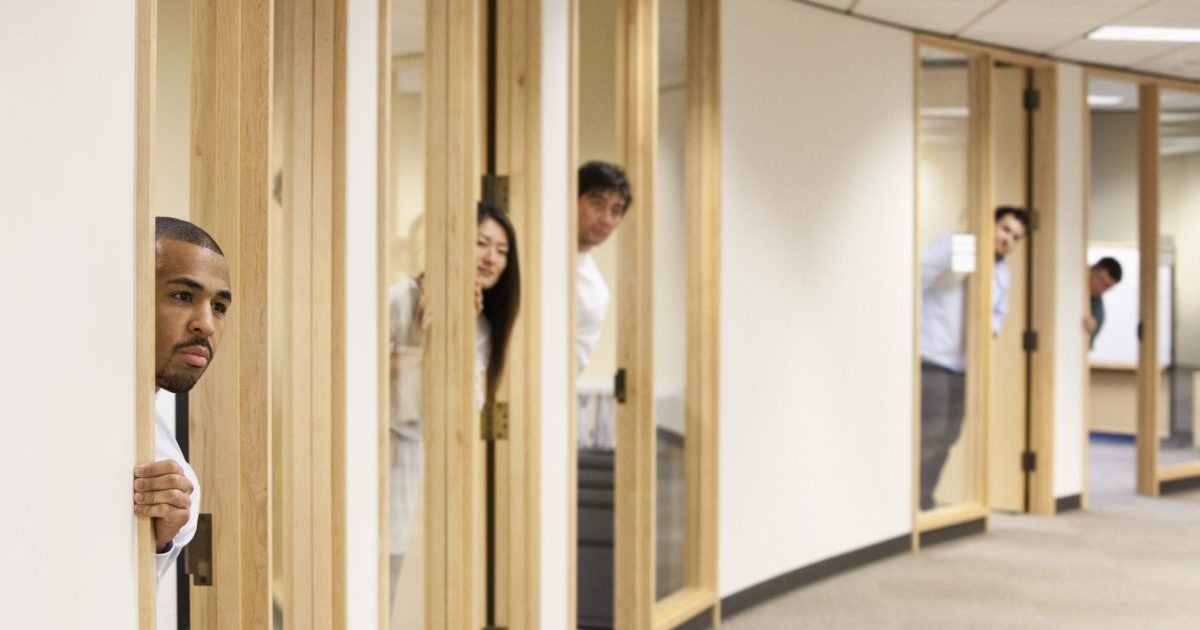You’re always late

Bad timekeeping is a social faux pas in any context, let alone at the workplace. Failing to turn up on time is something you might be excused for once or if there are reasons beyond your control (family emergency, unexpected train/bus cancellation). If you’ve just missed your alarm or decided to leave the house with hardly any time to spare, however, it’s on you and speaks volumes as to how much respect you have for your job and employer.
You don’t like unexpected assignments

Even though 99% of jobs have clear-cut objectives and areas of expertise, it’s common these days for employees to be fluid across departments in the sake of an absence. If a task is put on your desk one morning, reacting negatively or refusing to undertake it will put a huge dent in your reputation. Work places are largely team efforts and displaying any trace of selfishness will be a red flag to your boss.
You don’t respect your co-workers

Holding court as an independent employee among a department or team is a huge way to tell your boss, “I don’t respect this company or anyone in it.” Complaining about anything is a drag, but complaining about those you work with is a slippery track that could lead to you complaining about people in positions above you. Forget about any chance of career progression if you’re letting higher-ups have it from both barrels.
Nobody at work likes you

You might think your boss is up in the clouds at the best of times, but they do catch on to how their employees interact with each other. A difficult employee that nobody likes will stick out like microwaved salmon. Not everybody can or will get along in life, or at work. It’s normal for one co-worker to look right through you, but for everyone in the office to do it? Bad news. That’s a you problem, and something you should start working on ASAP if you want to stay in the job.
You are always gossiping

Work places can be dull, especially during that midweek slog where time seems to slow down, which leaves plenty of room for gossiping by the kitchen or even at your desk. Grasping the nasty downsides to gossiping is something you should learn and grow out of by the end of high school, so contributing to the rumour mill in an otherwise mature office will expose you as puerile and untrustworthy.
You don’t take ‘no’ for an answer

Rolling over and accepting every single other opinion may impress some bosses who hope to seize complete power over a workforce, but the best ones will understand that debates and constructive criticism are healthy facets to a thriving company. However, if you struggle to accept ‘no’ for an answer, even when you know you’re probably in the wrong, you will present yourself more as a burden and less as a passionate employee.
You receive regular customer complaints

Negative feedback is perhaps the most obvious sign that an employee is a liability. Receiving customer complaint after customer complaint suggests that you are incapable of setting a good example or providing good service. While getting off on the wrong foot with a customer might not seem like the end of the world, if it happens often enough, word will spread and the company may take a hit in the long-term. Your boss will not be happy about this.
You display a passive-aggressive attitude

Every office needs an ice-breaker in human form here and there, but there’s a fine line between being playful and being inappropriate. Sarcasm, snide jokes or comments aimed to cut people down are signs to look out for as an employee of a company. If it walks like a duck, swims like a duck and quacks like a duck, it’s probably a duck. If you’re acting like a passive-aggressive bully, then you probably are one.
You micromanage your co-workers

If your co-workers turn to you for advice, that’s brilliant. It shows you not only have authority on the work at hand but that you’re easy-going enough to be approached by someone in a pickle. But remember, you’re not their boss. They already have one, and they won’t be happy to see you dishing out unwanted tips for the sake of being seen dishing out unwanted tips. Don’t lord your non-power over people in the same department as you unless you want an uncomfortable meeting.
You don’t tidy after yourself in the kitchen

Ah, the office kitchen; simultaneously the best and worst place in any office. While it’s great to prepare your own food or make yourself a cup of coffee, having to deal with other people’s messy habits is enough to make your blood boil. It’s not just the effect it has on the boss: leaving a counter top littered with dirty plates, cutlery and/or rotting food can end up upsetting the whole work force.
The bare minimum is your limit

Doing the bare minimum is sometimes known as ‘quiet quitting’, which is quite frankly a better name, but we’ll stick with the former cause it’s more established. Doing what is asked of you is fine. It’s what you were hired to do. It’s never going to get you fired. But it’s also never gonna get you into a higher position. If you want to progress in your career, you’re gonna have to go the extra mile now and then.
You make excuses

Sometimes in the work place, things out of your control negatively impact your efforts. Maybe there’s a lousy internet connection, or a lagging mouse you’ve been handed. Maybe a stray dog runs into the office, causing sheer disarray and panic. A lot of the time, though, excuses are excuses and little else than a reminder to your boss that you fail to take any responsibility for sloppy or unfinished work.
You’re a busy idiot

Stop. Stop doing that. There’s no need. I know it looks like you’re doing a lot but really, it’s nothing. Stop. Just stop. We all know what you’re doing, or what you’re not doing. Especially the boss. He’s watching. And he’s not impressed. Put that down. Just go to your desk and do your actual work. No, no. Stop. We have a cleaner for that. Go to your desk. For the love of God man, stop faffing about.
Your higher-ups stop socialising with you

After work drinks are a good way to break the ice with a new employee or raise an issue to a manager in a less sugar-coated way. But if you have a higher-up who suddenly stops meeting up with you in informal settings, you should probably be worried. That’s a sign of someone withdrawing a friendship to make a sacking easier and less personal.
You overshare too much

Oversharing, if done innocently and sparingly, can be quite funny, if not endearing. But if you’re someone who purposely overshares day-in day-out, your co-workers will definitely hate you. When telling a story in the office, you should start to wrap things up on the third or fourth “Yeah” you receive. If someone says “Wow,” abandon ship immediately. Oversharing is just not as exciting as you think it is.
You can’t prioritise

You can lead an employee to their desk but you can’t make it organised. Prioritising work and what needs to be done in what order to ensure a smooth, trouble-free day is pretty much on you. Managers and bosses can’t hold your hand the whole day and do the hard bits for you. Self-organisation is key to any job, particularly if you’re dealing with an excess of paperwork or emails.
You don’t have any references

On any respectable CV or resume is at least one reference for potential employers to contact and gauge your authenticity and reputation – in other words, to see if what you’ve told them can be backed up in any way. If you don’t have a single person from your job history who can vouch for you, it’s just about the biggest nail in the coffin imaginable. Having no references is going to prevent you from gaining employment in not all but many industries.
You aren’t given important tasks

Say something unexpected comes up. Your manager, flummoxed, cannot deal with it and decides to hand it to one of their team, the most trusted worker, who can securely and sufficiently complete said task. If this is never you, it’s gonna come off terribly to your boss. “Why isn’t X ever given these unexpected tasks Mr. Manager?”, your boss will ask. “Oh, that’s because they’re terrible and untrustworthy,” your manager will reply.
You violate company policy

Violating company policy, it should go without saying, is not a great look for you and your employer. It’s terrible, actually. Just about the worst thing you could do in any given job. Every company has an employee handbook, in case you’re in the blue about what company policies tend to preach. Violate these and you’re not only putting your existing job at huge risk, but future vacancies you apply for.
You’re overly emotional

In the age of the Wellness Policy, more and more companies are setting examples as forward-thinking bastions of inclusiveness and kindness. They’re here to tackle your problems, embrace your anxieties and give you all the time you need to ensure sound mental health. Of course, none of them mean it. Crying at work everyday? Pull yourself together! Anger, sadness, all of these feeling are normal… to an extent. However, if you’re enraged or inconsolable all the time, it’s going to hinder your work.
You lie in your interview

Lying is a strong word but it’s expected for interviewees to exaggerate the truth when speaking to a potential employer. Some CVs just don’t sparkle as much as others and if you wanna stick out, you might feel the need to take liberties. By this, we mean adding an extra job responsibility under a certain role, extending the time frame of another role by a year. We don’t mean making out like you managed an entire team. That is going to be exposed if you’re tasked with it at a new job.
You keep referencing your old job

We’ve all got a few funny or helpful story from our past jobs that may bring something to the table at our new one, even if that ‘something’ is just an innocent laugh between co-workers. But watch out not to reference your old place too much as it looks like you haven’t moved on. Especially don’t reference it as a better place with stronger credentials.
You chew gum

From a certain point of view, chewing gum is quite a thoughtful thing to do. It keeps your breaths feeling nice and minty fresh in a crowded room where someone may have just eaten microwaved salmon. However, in some countries gum-chewing is considered extremely offensive. Singapore even has a ban on the stuff. It’s believed this social attitude comes from the idea that chewing gum mimics the loud chewing of food, which is off-putting to many cultures. It may, as such, be off-putting to your colleagues in the workplace.
You ask too many questions

New hires asking questions is a healthy thing. It would be weird if a newcomer to a workplace didn’t ask anything at all. But like a lot of points made in this list, there are fine lines that shouldn’t be crossed if at all possible. Asking too many questions could be a sign to your employer that you’re so not much curious as you are clueless. If you don’t have at least a basic grasp of your job, the company is going to wonder why they ever brought you on.
You threaten to leave

Let’s say you’ve been in a job for two years. You’ve done fairly well over this time and feel you’re due a pay rise or higher role. There are respectful and mature ways of doing this. Simply asking your manager or boss for a quiet formal chat when they’re free and broach the subject. Do not accost them when they’re not ready and demand some form of progression. Better yet, don’t threaten to leave and hint at other companies interested in you, as it shows you don’t care about the workplace you’re in.
You stick your nose in other people’s business

There’s a very fine line between personal chit-chat and being outright nosey and intrusive. Butting your nose into the life of a co-worker unwarranted will make you look very bad in your boss’ eyes. Every employee, every human, deserves the right to privacy, and overstepping the mark to find someone out in whatever way is unprofessional.
You waste company time

Work is work. It’s not an extension of your house or apartment and certainly not some kind of chill-out zone. Keep your personal matters out of the office and your rota. Emergencies happen from time to time, so there are some exceptions. But generally, don’t undertake any non-work related task at your desk. This could be messaging friends, online shopping or clipping your nails.
You have bad hygiene

We’ve all known a colleague from our lives that has stunk. If you haven’t – as the golden rule goes, it’s probably you. So what next? Get a shower first, stinky. And brush your teeth. And no, don’t just towel dry your hair. Run a comb through it. Fasten that top button and put on clean socks. Nope, don’t turn your boxers inside out. You’re a grown-up now, and you should smell like one. Bad smells elicit bad reactions.
You leave early

Leaving early can be justifiable in the event of an emergency or an employee starting work an hour before they were due in, but most of the time it’s a shocking display of arrogance to not only your co-workers but also your boss. Unless you’re absolutely smashing your job and making the company huge amounts in profit , and are also a stand-up employee in every other conceivable way , then regularly clocking off early will always look bad.
You don’t treat deadlines with respect

Deadlines schmeadlines. Who needs ’em? The company, truthfully. Without deadlines, without the ticking clock, nothing would ever get done. Workplaces would just be sappy old love-ins where everyone’s playing pool and drinking beer. If you’re the type of employee who has a blatant disrespect towards deadlines, your boss is going to fume!
You flirt with co-workers

Easy with the hands there, Casanova! This isn’t some singles bar. Going overboard with the flirting in the workplace was never “good,” even if it was considered more acceptable in the past. These days, however, it’s more likely to be considered sexual harassment – something that HR will have a field day with if the object of your misplaced affections alerts them about it. So leave the bad chat for the work socials. You were hired to work, not to make a pass at anything with a pulse.
You don’t welcome new employees

Starting a new job can be daunting so it helps to be a part of a workforce or team that is friendly and approachable. To be around people willing to go out of their way to help you settle in so you can eventually thrive independently. What they don’t want is for some high school-ish jock figure to deliberately intimidate them at every step of the way.
You show no aspirations

Now and then, your manager or boss will bring you aside and ask some variation of, “What do you want out of this job?” It’s a corny question that necessitates a cornier answer but if you don’t play ball, you could come across as unambitious and set in your ways. If the company you work for is a hip, young gunslinger, they’re gonna try and push out the drab filler.
You take all your holidays at once

Work holidays are a reluctant business. Yes, companies are obliged to offer them to everyone they hire, but they don’t really like it, especially if you take the mickey and book them all at once. Bad employees will do this around Christmas. They’ll wait the whole year and then drop a two-week holiday on you just at the time the company needs you most. This will show your boss you’re not here to be taken seriously.
You take credit for other people’s work

99.9% of jobs are upheld by teamwork. Teamwork makes the dream work, etc etc. Don’t be that guy who runs off with the final product or result and waves it in the bosses face saying, “Here you go sir, I’ve done it!” when you know full well you’ve been sat with your feet up watching everyone else break a sweat trying to put project together.
You cut people off in meetings

Say you’re in a meeting. An important one. Fishbowl fodder. Say your colleague Gary is about to make a point, maybe suggest a solution to a problem. You have a personal grudge against Gary and don’t respect any of his opinions, so you butt in and cut him off. That not only makes Gary feel like a less valued member of the company, but gives off huge ‘Pick Me’ vibes from yourself.
You spend ages in the toilet

When you gotta go, you gotta go. A boss has no right to slate your bladder bursting at the seams, but let’s not carried away. Get in, do your thing, get out. A toilet visit should happen two to three times per working day, realistically. If it’s happening fourteen to fifteen times a day, it’s either a medical emergency or you’re slacking off from work.
You lack integrity

An employee should never just go about running their mouth off, effing and jeffing and causing a big fuss, but they shouldn’t be walked over either. Bosses are strange like that. They’ll sometimes reward the brashest over the brightest. Now and then, be sure to make your voice and opinion heard, so long as it’s justified morally or professionally. This shows courage and character.
You gaslight colleagues or bosses

Did you know 2022’s Word of the Year was ‘Gaslighting’? The word, described as, ‘behaviour that’s mind manipulating, grossly misleading or downright misleading’ increased in searched by 1,740% that year. You want to avoid doing this at all costs for obvious reasons. Mind games in the office never end well and only seed division. No company benefits from division. Divisions, yes. Division, no.
You turn up hungover

The morning after the Christmas party is pretty much the only time in a calendar year that you’re going to be excused for turning up to work reeling from booze. Getting plastered outside of work on a Tuesday night in January and failing to get anything done in the office the day after is a you problem. Completely self-inflicted and selfish. Your boss will always be able to tell. The eyes, Chico, they never lie.
You don’t like to lead

Although as a basic employee you will never be tasked with leading the whole ship, you sometimes may be tasked with leading a certain section of the ship, and you should be ready for this if you mean business. Not everyone is born for leadership, and fewer desire it, but that’s not to say you shouldn’t at least try to embrace it if thrown your way.
You are inarticulate

Good communication cannot be important enough, especially if you work a sales-based job. Having employees that can put together concise, clear and expressive communication when talking to others is very crucial for a lot of bosses out there, so you better make sure you’re on your A game. Grumbling and grunting your way through a conversation with a potential business partner won’t end in a handshake.
You aren’t tech-savvy

In 2023, there are really no excuses. You have to be literate with technology. This isn’t some fringe activity that your company is entertaining on the off-chance that it becomes big. It’s the norm and for you to not know your way around a certain social media app or program is pretty sloppy. It shows that you’re stuck in the past and unwilling to go with the flow.
You don’t follow trends

A lot of employees tend to think that once they’ve landed a job, that’s it, they don’t have to go out of their way to keep up to date on the industry. But you should always be following or at least tracking new trends within your line of work. Your boss will love knowing that they have someone with their finger on the pulse who can relay the latest developments to them.
You have a potty mouth

This should go without saying but, if you’re the type of person who struggles to filter their language, listen closely: swearing is not acceptable in any workplace, unless you work for a company that comes up with new swear words. Your boss doesn’t care if you don’t mean any harm or that they’re “just words”; cursing doesn’t belong in the workplace.
You don’t attend company events

Company events, on paper, sound like a great thing. A more or less free trip away from the office, often abroad in sunnier climates? In reality, it’s a little different. A company event is still work, even if you’re wearing shorts during the day. You’re expected to do all the regular schmoozing that you would at home. That said, company events will also take place near your office and you’ve got no excuse not to attend those.
You’re a bad listener

You know when you’re sat talking to someone and they’re saying “Yeah… yeah… yeah… yeah… yeah… yeah…” Annoying isn’t it? This is a big no-no when it comes to the workplace, especially if it’s your boss talking to you. Don’t talk over them. Don’t get your phone out. Just listen. Sit and properly listen. It is extremely obvious to tell when someone hasn’t paid any attention to what you just said.
You bad mouth people outside the office

If you have a problem with someone, say it to their face. Don’t shy away and then talk smack about them behind their back in the bar after work. This isn’t just a rule for employees, but anyone really. Being snide and fake will never win you any points with other people, not least your boss or manager. They will reasonably expect that you say the same things about them when they aren’t around.
You send unnecessary emails

Your boss is a busy person. It may not seem it when they’re sitting around doing nothing but they are. The last thing you want to do is hound them with frivolous, pointless emails that can be solved by a quick chat by the kitchen or in their office. Your boss will be in contact with a LOT of people, so don’t get in the way of important communication.
You don’t use headphones

Some offices don’t permit the listening of music full stop, so if you’re lucky enough to be in one where it’s allowed, don’t take liberties and blast your music out loud like some child on a bus. The rest of the office – believe it or not – do not share the exact same music tastes as yourselvf. And even if they do, who’s to say they want to hear it while concentrating on work? This is just inconsiderate.